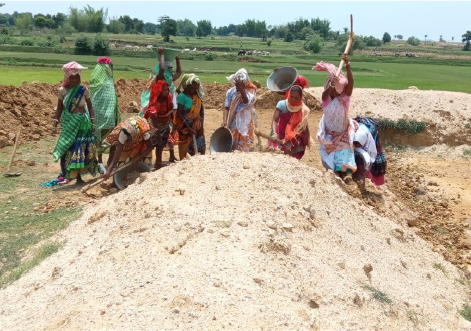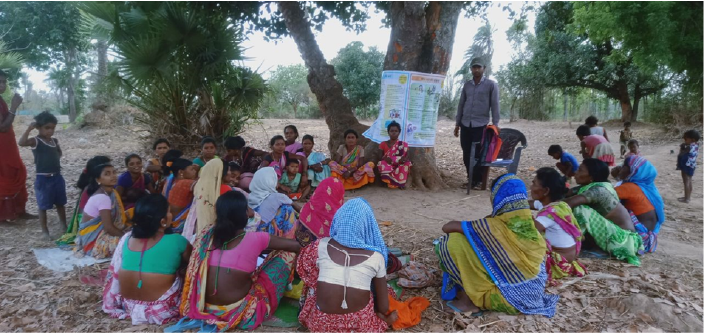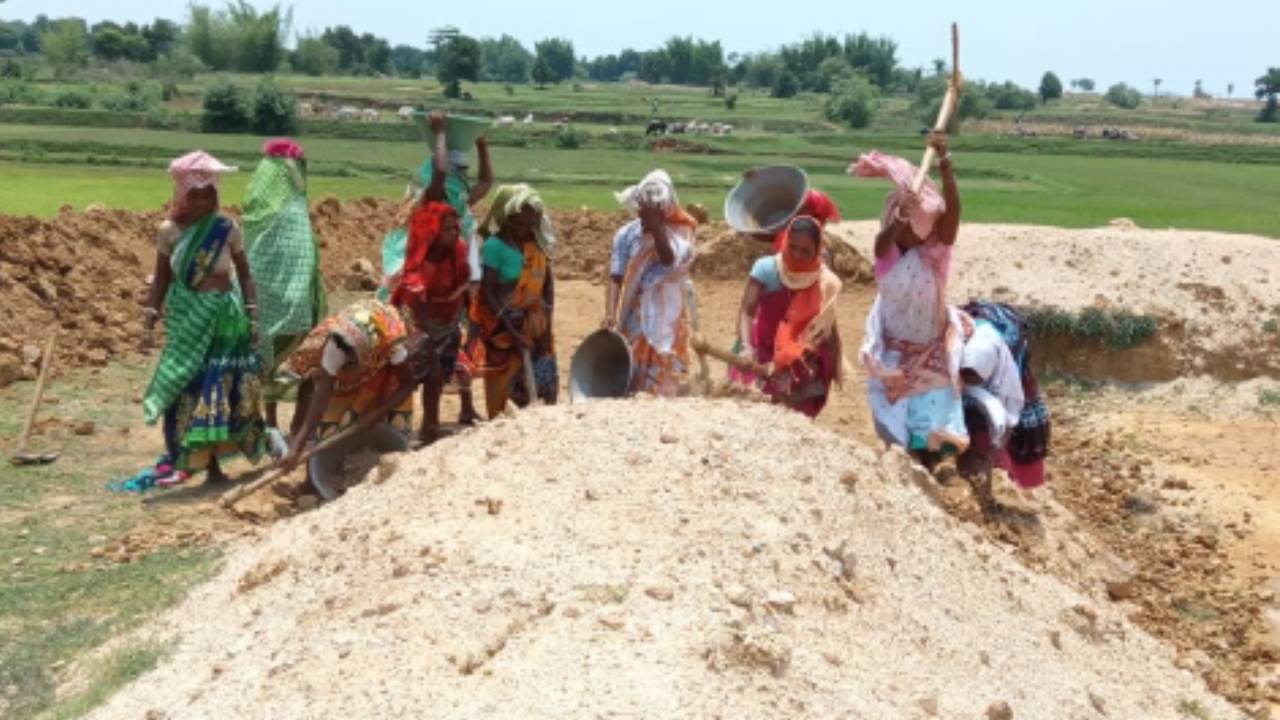“Coming together is a BEGINNING
Staying together is PROGRESS
Working together is SUCCESS”
by Saroj Kumar, Banka, Bihar
- Home
- Stories From The Ground
- “Coming together is a BEGINNING Staying together is PROGRESS Working together is SUCCESS” by Saroj Kumar, Banka, Bihar
“Coming together is a BEGINNING
Staying together is PROGRESS
Working together is SUCCESS”
-Henry Ford
Unbearable heat, long walks, and no work; this was the new reality for the villagers of Katoria block in Banka district of Bihar with the arrival of COVID-19 in 2020. The endemic had left them with no source of livelihoods. The villagers were scared; more because of the fear of hunger, lock-down, and the cross-country walks, than the fear of disease!
Insufficient landholding-Scarce Income
Almost sixty percent of the population in Katoria belongs to the Santhal tribe. They have less than one-acre land per family. With COVID-19 lockdown, even the crops harvested from these lands were not getting sold.
“Bahut pareshani ho gai thi, khet kamm hai humare paas aur usme jo bhi ugaa rae the wo kahin bech nai pa rae the, samajh nai aa raha tha kya karein” (We were in a lot of trouble. We have less landholding and whatever we were growing on that, could not be sold because of lockdown. We didn't know what to do!), said a visibly distressed Mukesh Kisku from Inarawaran village in Katoria block.
A migrant worker, forced to leave his village behind, Mukesh Kisku was habitual of going to cities to earn money and send it back for the daily needs of his family of eight. With Covid-19 lockdown and no work in sight in cities, Mukesh Kisku had to come back to his village. There was a happiness in coming back to his family, but a bigger challenge was awaiting him; how will he feed them?
Mukesh is just one face, there were hundreds like him in those villages who were undergoing similar turmoil and uncertainties.
Many Struggles!
The villagers were constantly looking for work. There was a continuous struggle. The only source of comfort for them? Mahatma Gandhi National Rural Employment Guarantee Scheme (MGNREGS) – that assures 100 days’ work to the job-card holders.
However, there was an inherent problem. The villagers were not fully aware of all the rights the Act guaranteed them.
“Humein pura 100 din ka kaam nahi milta tha, paise bhi kamm milte they, bohot dikkat hoti thi” (we didn’t use to get work for 100 days in a year and used to get less money as well, it was a very confusing situation for us) says Mukesh Kisku while talking about his experience of availing work under MGNREGS.
 Labour group working under MGRNEGS scheme
Labour group working under MGRNEGS scheme
The intermediaries were adopting unfair means to make it more difficult for people like Mukesh who genuinely placed demand for work. They used to generate work in the name of those households who didn’t wish to work under the scheme and machines were used to complete the required work. Also, they used to withdraw the wage from the beneficiary’s account using biometric fingerprints and pay Rs. 200 to Rs. 300 in cash to the labourers, keeping the rest of the money with them.
The ‘START’ of a labour collective!
“Labour group banne se bahut achha ho gaya, ab hum mil kar apne haq ki awaaz uthate hain, humein kaam milta hai aur pura paisa bhi and dalal ab tang bhi nai kar pate hain!” (The formation of the labour group made things easy for us. We demand for our rights together. We also get work and entire money for it. Also, the market-intermediaries don’t disturb us anymore!), says Bhudev Lakrama, member, Rajbaha Labour Group with a slight hint of success in his tone.
PRADAN under the START (Stimulating Tribal and Rural Transformation) project helped the villagers form a labour group called ‘Rajbaha Labour Group’ in 2020 for Kolalvary village of Katiyari Panchayat in Katoria block to create awareness about MGNREGA and the villagers' right to employment. Today, the group comprises of 24 labourers, both men and women, belonging to the marginalised sections of the society. Regular meetings are organised, training camps were arranged by the labour group. Several discussions were held between the administration and the labour groups representing their community, to deal with the confusion and the issues around MGNREGS employment. These discussions helped the villagers get their job cards for work under the scheme as well.
 The member of the Rajbaha Labour Group in a meeting
The member of the Rajbaha Labour Group in a meeting
“Ab hum mil kar awaaz uthate hain, dalal ke khilaf bhi. Sabko job card bhi mil gaya hai, kaam milne me koi dikkat nai hai, aur samay pe paisa bhi milta hai” (now we ask questions together, even against the market-intermediaries. We all have gotten our job cards now, there is no problem in getting work and we get full payment on time as well), says Mukesh Kisku while talking about the benefits of the labour group.
The success in fighting malpractices and getting regular work has brought vibrance in the labour group.
“Jyada se jyada log judenge ab iss group se, humne jo kaam kar ke dikhaya hai, logon me utsukta aai hai” (More and more people will join this group now. What we have achieved by coming together is creating curiosity among fellow village members), says an excited Bhudev Lakrama on being asked about the future of this labour group and their work.
The entire process of creating collectives under the START project has helped everyone understand the importance of having a vocal community to put forward their demands and realise them. It was the power of the collective, the power of collective efforts of the labour group which could overcome the market-intermediaries; this change would not have been achieved by efforts of an individual.
Today, this group is also inviting and including officials from the district administration to all these discussions around the scheme which is in return ensuring the smooth functioning of schemes like MGNREGS.
Way forward
Soon, there will be more and more labour groups formed under the aegis of the START project, both at the village and the cluster level to provide better employment opportunities to the villagers. Also, it is planned under the project ‘START’ to provide regular training to these groups and help them realise the rights granted to them under the constitution of India!
Edited by: Nivedita Kashyap


